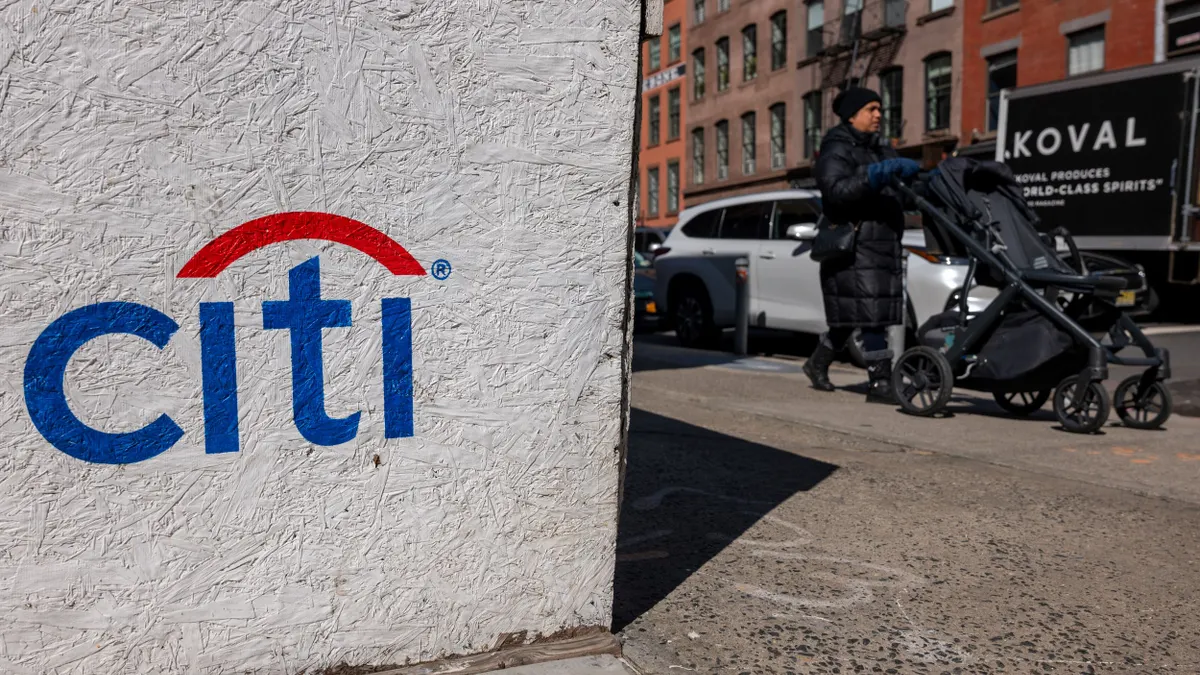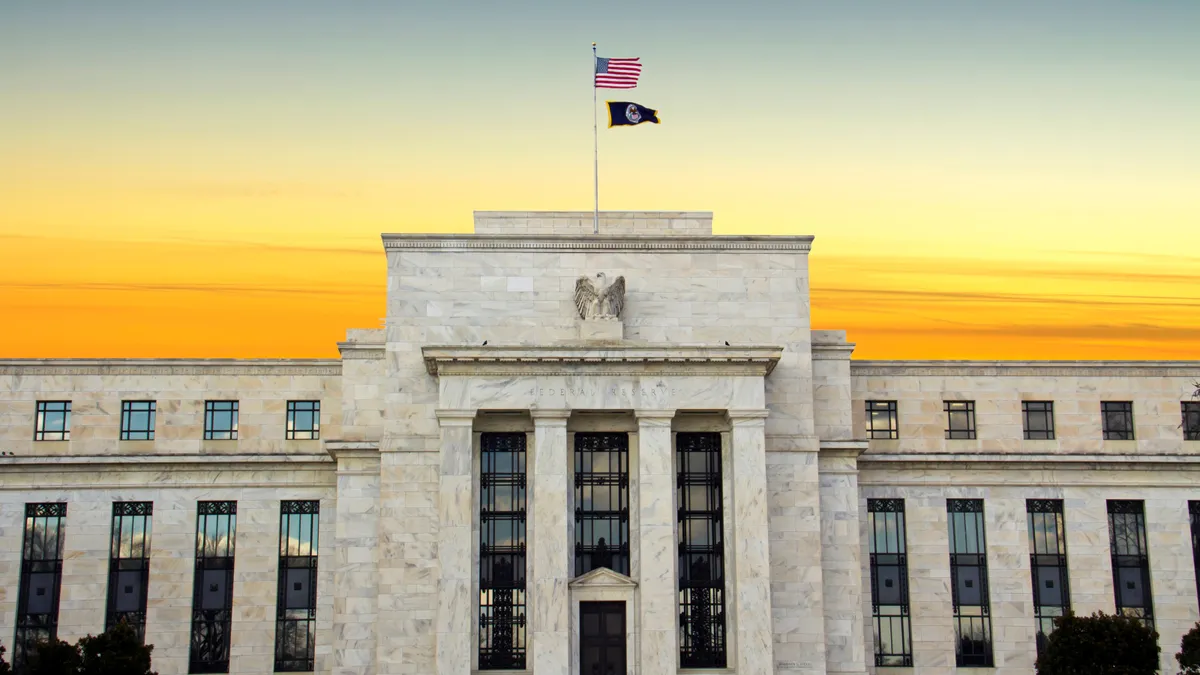JPMorgan Chase CEO Jamie Dimon didn’t pull any punches Monday during an appearance at the American Bankers Association convention, taking swings at regulators and big-box retailers and encouraging industry challenges to regulatory initiatives.
During a half-hour Q&A session with ABA CEO Rob Nichols at the annual convention, held in New York City, Dimon opined on artificial intelligence, fraud and geopolitics. But his sharpest comments were reserved for regulatory efforts related to capital requirements and open banking.
“It is an onslaught,” Dimon said of the regulatory environment for banks. He lamented the increased scrutiny for banks trying to pursue mergers or acquisitions, and the length of time the industry has spent talking about the Basel endgame. Meanwhile, industry lawsuits challenging regulatory action have become common.
“Is this the way we wanted to run the railroad?” Dimon asked pointedly.
Banks are “suing our regulators over and over and over, because some of these things have become unfair and unjust,” he said.
For a long time, banks were unwilling to fight with regulators “because they would just come and punish you more,” said the CEO, who’s been at the helm of the biggest U.S. bank for nearly two decades.
“I’ve been told by people at the [Federal Reserve], that, ‘Because of what you have said and what you wrote about, they’re coming after you,’” Dimon said. “It’s gross. Time to fight back.”
Industry trade groups such as the ABA, the Financial Services Forum and the Bank Policy Institute have coordinated on how the industry will attack what it sees as problems, he told an audience of bankers from across the country.
Litigation just to make a point should be avoided, but “if you’re in a knife fight, you better damn well bring a knife,” Dimon said.
That applies to big-box retailers, too, Dimon said, adding that Regulation II – the Fed’s proposal to reduce the cap on debit card interchange fees – “really pisses me off.”
“It’s time to fight back. I’ve had it with this s---,” he said.
The industry is now “going to war” with retailers, and although JPMorgan banks many of those companies and it’s not Dimon’s preferred way of dealing with problems, “we have no choice,” he said.
Despite the flurry of regulatory activity in recent years, measures on resolution and stress testing didn’t prevent last year’s collapse of Silicon Valley Bank, Dimon said.
He wants to see regulators step back and assess why, and consider what can be done to improve the system with the goal of avoiding scenarios where a bank failure results in “complete hysteria” in the banking system. That might include reconsidering deposit insurance or liquidity access, he said.
“That’s the biggest problem I have with all these various rules and overlapping things and the stupidity of some of them,” Dimon said. “We aren’t actually stepping back and saying, what can we do better, to make the system work better?”
As JPMorgan collected deposits amid SVB’s downfall, Dimon said he “thought it was the worst thing for us – JPMorgan – and for you, to call into question the banking system again.”
Here are snippets of Dimon’s comments on other notable topics:
Basel III endgame
“The devil’s in the detail. And there’s a lot of detail,” he said, regarding regulators’ plans to revamp the capital requirements proposal, shared last month. “A lot of this stuff isn’t justifiable,” he contended, calling out “ridiculous” calculations and duplicative and inconsistent regulation.
Dimon noted the disagreement within the Federal Deposit Insurance Corp. board over moving forward with a new proposal, but said the Fed and the Office of the Comptroller of the Currency could move ahead.
“I would prefer that, so at least we get to see it and start to comment on it,” he said. “If they don’t put it out, it’ll wait until after the election. I don’t know what’ll happen after that. My view is, nothing’ll be done, because it’s going to be too hard to get it done.”
Open banking
Dimon said the Consumer Financial Protection Bureau’s finalized rule, issued last week, doesn’t stop screen scraping and doesn’t offer a “clear liability shift” if data is shared and funds are stolen downstream, so banks aren’t labeled responsible. The banking industry has flagged liability over data security as a top concern.
“If you have an open banking system, the customer should decide what information goes, how they can use it, and it should be very clear,” he said, rather than simply pushing a button that says, “I agree.”
The rule was swiftly followed by a legal challenge: The BPI, Kentucky Bankers Association and Lexington, Kentucky-based Forcht Bank filed a lawsuit last week, asserting the CFPB overstepped its authority and adding that the rule would put consumers and the banking system at risk.
“We’re going to fight, we’re going to win this one, too,” Dimon said.
CFPB Director Rohit Chopra has defended the rule and said he doesn’t think the industry has read it.
Dimon bemoaned the response to the industry’s reaction to the rule.
“They always say the same thing – the banks are complaining. When people complain, you should listen to what it is – maybe they’re right. And I think they should respond to what has actually been said. Not to this, ‘they’re fighting to maintain their franchise.’ No, we are not.”
Shadow banks
Dimon said regulators should “be a little more thoughtful” around risk and fairness when it comes to shadow banks and nonbanks, since some companies are engaging in the same activities as banks but aren’t subject to the same requirements – particularly, anti-money laundering, Bank Secrecy Act and know-your-customer rules.
As some banking activity has moved outside the banking system, Dimon said he wishes regulators employed more “forethought.”
“Did they mean to drive 80% of mortgages out of banks? Do they mean to drive a lot of lending out of banks? Do they mean to drive a lot of payments out of banks? Is that what they meant, and do they understand the risk they’re creating on the other side?” he asked.
Fraud
In beating back fraud, JPMorgan has “permanent kind of war rooms, because these criminals are really good,” Dimon said.
It’s costly to fight fraud, and many third parties have “no responsibility,” Dimon argued. “I think that’s wrong.” Legislation and enforcement may be needed, to assign third-party responsibility, he said.
Banks have to “constantly up our own game,” Dimon said.
But in a system where banks are responsible for every payment knowingly sent – “the moral hazard of that is just extraordinary,” he said.






















